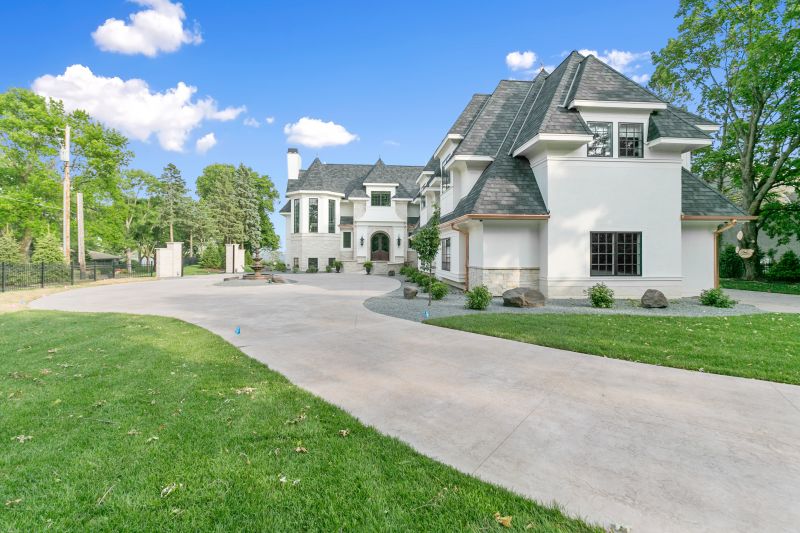Leading Choices For Concrete Driveway Replacement Supplies
Explore top supplies trusted by professionals to ensure a successful and lasting concrete driveway replacement.
 Replacing a concrete driveway involves selecting the right products to ensure durability, safety, and aesthetic appeal. The process typically begins with removing the existing concrete, which may require specialized tools and equipment to break up and clear the old surface. Once the area is prepared, a sturdy base layer of gravel or crushed stone is usually installed to promote drainage and stability. The new concrete is then poured, leveled, and finished to achieve a smooth surface suitable for vehicle traffic and foot movement.
Replacing a concrete driveway involves selecting the right products to ensure durability, safety, and aesthetic appeal. The process typically begins with removing the existing concrete, which may require specialized tools and equipment to break up and clear the old surface. Once the area is prepared, a sturdy base layer of gravel or crushed stone is usually installed to promote drainage and stability. The new concrete is then poured, leveled, and finished to achieve a smooth surface suitable for vehicle traffic and foot movement.
Top Overall Option
High-Performance Concrete Mix
A high-performance concrete mix offers a balanced combination of strength, workability, and durability. Designed for large-scale projects like driveway replacements, it provides a solid foundation that can withstand heavy loads and resist cracking. When properly mixed and installed, this type of concrete can contribute to a long-lasting, low-maintenance surface suitable for various climates and conditions.
Types of Products For Concrete Driveway Replacements
Standard Concrete Mix
A versatile option suitable for most driveway applications, offering good strength and workability.
Rapid-Set Concrete
Designed for quick curing, ideal for projects needing faster completion times.
Colored Concrete
Adds aesthetic appeal with a variety of color options for decorative driveways.
Stamped Concrete
Provides textured patterns that mimic stone, brick, or other surfaces for decorative purposes.
Reinforced Concrete
Includes steel reinforcement for enhanced structural strength and crack resistance.
Self-Leveling Concrete
Ensures a smooth, even surface with minimal effort, suitable for overlays and repairs.
High-Strength Concrete
Offers increased compressive strength for heavy-duty driveway applications.
Fiber-Reinforced Concrete
Contains fibers for improved crack resistance and durability.
Polymer-Modified Concrete
Enhanced with polymers for improved adhesion, flexibility, and water resistance.
Overlay Concrete
Used for resurfacing existing driveways, providing a fresh, uniform appearance.
Crack-Resistant Concrete
Formulated to minimize cracking over time, extending surface lifespan.
Eco-Friendly Concrete
Contains recycled materials and formulations designed to optimize performance.
Pre-Mixed Concrete Bags
Convenient for small repairs or DIY projects, ready to use with minimal mixing.
Form Release Agents
Facilitate easy removal of molds and forms, ensuring clean finishes.
Concrete Sealers
Protects the surface from stains, water infiltration, and wear over time.
Popular Choices
A commonly used option for general driveway replacement projects, offering reliable performance.
Popular for decorative driveways, providing customization options for aesthetics.
Chosen for its textured patterns that mimic natural stone or brick surfaces.
Favored for its added strength through steel reinforcement, suitable for heavy use areas.
Preferred for overlays and repairs, ensuring a smooth finish with less effort.
Selected for demanding applications needing enhanced durability and load-bearing capacity.
Popular for its improved crack resistance and longevity in high-traffic areas.
Widely used to protect new surfaces from stains and water damage, extending lifespan.
Convenient for small-scale repairs or DIY projects, offering ease of use.
Often chosen to minimize future cracking and maintenance needs.
Popular for its enhanced adhesion and flexibility, especially in challenging conditions.
Used for resurfacing existing driveways, providing a fresh appearance.
Choosing the appropriate materials is crucial for a successful driveway replacement. This includes selecting high-quality concrete mixes, which can vary in strength and setting times, as well as considering surface treatments or sealants that can extend the lifespan of the new surface. For homeowners seeking a more decorative look, options such as stamped or colored concrete can add visual interest while maintaining functionality.
Proper installation techniques are essential to prevent common issues like cracking, scaling, or uneven settling. Many professionals recommend using reinforcement materials such as steel rebar or wire mesh within the concrete to enhance structural integrity. Additionally, ensuring proper drainage and slope during installation can help mitigate water-related problems that often lead to deterioration.
Maintenance and periodic sealing can significantly influence the longevity of a concrete driveway. Regular cleaning, sealing, and addressing minor cracks early can preserve the surface and reduce long-term repair costs. When selecting products for replacement, it is important to consider not only initial quality but also the availability of compatible accessories and additives that can improve performance over time.
Key Buying Considerations
- Determine the load capacity needed based on vehicle types and usage frequency.
- Assess the climate and weather conditions to select appropriate concrete mixes and additives.
- Consider the curing time and project schedule when choosing fast-setting versus standard mixes.
- Evaluate the desired aesthetic, including color, texture, and decorative options.
- Check compatibility of reinforcement materials with the concrete type for structural integrity.
- Review the surface finish options to achieve slip resistance or smoothness as needed.
- Ensure proper drainage features are incorporated during installation to prevent water pooling.
- Select products with suitable setting times to align with your timeline.
- Factor in maintenance requirements and choose products that facilitate easier upkeep.
- Verify the availability of accessories like sealers, form release agents, and repair materials.
- Consider environmental factors like freeze-thaw cycles that could impact material performance.
- Research product reviews and manufacturer specifications to ensure quality and reliability.
- Plan for long-term durability and resistance to cracking, scaling, or surface wear.
- Budget for both initial material costs and potential future repairs or treatments.
- Consult with professionals if unsure about specific product suitability or installation techniques.
